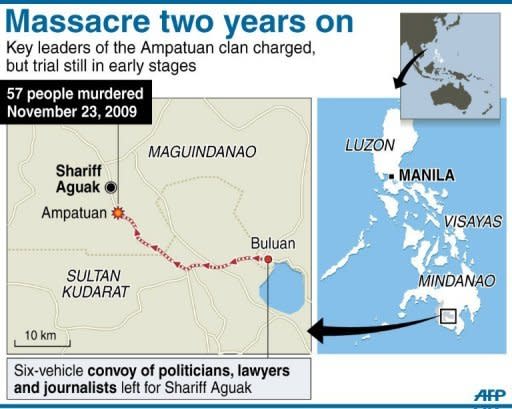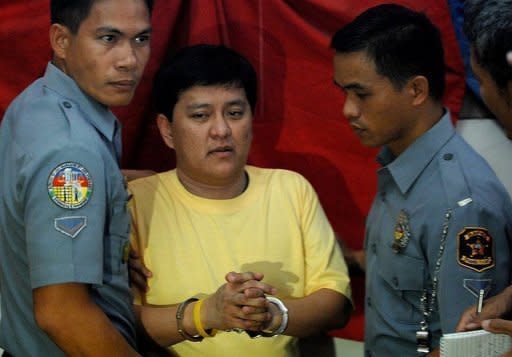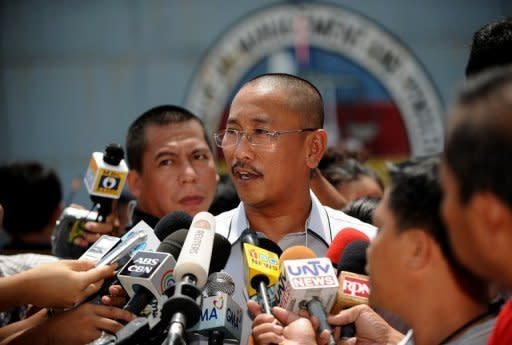Calls for justice two years after Philippine massacre
Relatives of 57 people killed in the Philippines' worst political massacre called on authorities Wednesday to speed up the suspects' trial as they marked the second anniversary of the murders. While key leaders of the Ampatuan clan who are accused of orchestrating the killings have been charged, their trial is still in its early stages and prosecutors fear it could take years before anyone is punished for the crime. Meanwhile, 100 suspects -- including members of the Ampatuan family, policemen and soldiers -- remain at large and relatives of the victims have complained that witnesses are being killed, intimidated or bribed. "Two years on, we still have not received justice for their deaths," said Grace Morales, 35, whose husband and sister were among the 32 journalists killed in the massacre. "We are demanding justice for them, even if we know it may be difficult to get." Morales and other relatives of the victims converged on a remote, grassy hill in the southern province of Maguindanao where gunmen mowed down the victims and dumped their bodies in a shallow pit. Relatives offered prayers and flowers and lit candles on a stone marker etched with the names of the victims in the world's deadliest attack on journalists. They then released white doves and balloons in the air as a sign of hope, and comforted each other as the solemn ceremony gave way to sounds of anguished weeping. Military armoured personnel carriers patrolled the hill to prevent sabotage attacks, after police said they found and defused two bombs left by the side of a highway leading to the site earlier in the day. The devices however were not strong enough to badly hurt or kill but could have been intended to send out a warning, they said. Philippine politics is well known for its violence, but the events of November 23, 2009 in this remote farming community shocked the world. Andal Ampatuan Jnr allegedly led a group of about 100 gunmen in stopping a convoy of cars carrying relatives of a rival political candidate, their lawyers and journalists, then massacring them. He allegedly led the killings because he wanted to stop Esmael Mangudadatu from challenging him in elections. Thirty-two of the victims were journalists travelling with the convoy to witness Mangudatatu's wife, pregnant sister and other relatives lodge his candidacy to run against Ampatuan Jnr for the post of provincial governor. Andal Ampatuan Jnr's father and namesake was at the time governor of Maguindanao and had been planning to install his son as successor. Ampatuan Snr ruled Maguindanao for nearly a decade, building a reputation as a feared warlord who used a private army of a few thousand men to ensure he and his relatives won elections. He ruled the province with the support of then-president Gloria Arroyo, who helped fund and legitimise his private army so it could be used as a proxy force against Muslim separatist rebels. Ampatuan Snr and Jnr are among 64 people who are on trial in Manila, with a total of 93 suspects having been arrested. Rights watchdog Amnesty International said the pressure was on President Benigno Aquino to speed up the "very slow wheels of justice". "The government has to show that it has the ability to render justice in a massacre that constituted the world's worst-ever attack on journalists and the world's worst-ever election-related single incident," it said. The US government said in a statement that the international community was watching. "The prosecution of this case is seen by many around the world as demonstrative of the Philippines' commitment to upholding the rule of law and protecting human rights," US ambassador to Manila Harry Thomas said.





